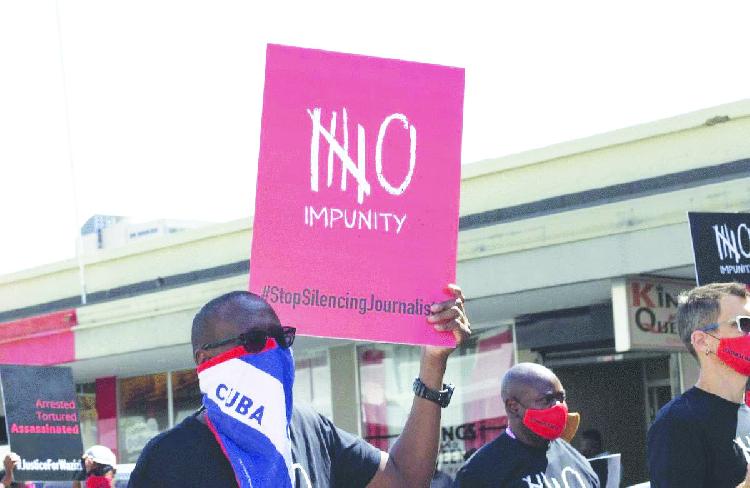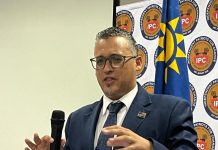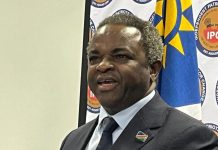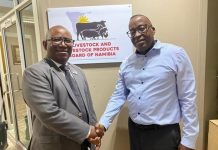Africa-Press – Namibia. OVER THE LAST three years there has been a sharp increase in threats, assaults, and attacks on media practitioners and media outlets in Africa. Just this year alone, 13 journalists were killed in nine months.
Undoubtedly an alert and courageous media is a clear threat to the agenda of all these adversaries. Let’s unpack the thriving culture of impunity in conversation with Zoe Titus, the director of the Namibia Media Trust. As the world marks International Day to End Impunity #2021, Africa is grappling with shocking statistics.
Zoe Titus: “I think this is a shocking number. It’s unprecedented and it really requires engagement by the public, and by policymakers. Since this onslaught on journalists and journalism is problematic for our democracies, it should be very, very worrying to all citizens.”
Giving impetus to the boldness of these attacks is the lack of political will in providing credible and coherent responses to these violations. The thriving culture of impunity is not only an indicator of how the media is being purposefully debilitated, but it also points to weak policing and justice systems.
7 April marked two years since the disappearance of Ibrahimo Abu Mbaruco in the Cabo Delgado region of Mozambique. A collective effort by international and African civil society organisations asking Mozambican president Filipe Nyusi to carry out a thorough investigation into his enforced disappearance was disregarded.
As was their deep concern about the violence inflicted by government forces against journalists reporting in the region. The death of Cameroonian journalist Samuel Wazizi – 10 months after he was taken into military custody – was announced in the most shocking manner.
Wazizi was arrested on 2 August 2019, and detained at a police station in the western city of Buea, after being accused of being a terrorist. That was the last time his lawyer and family had any contact with him. Two years later, the family still does not know when or how Wazizi died.
At the core of Africa’s thriving culture of impunity is the lack of political will to investigate the killings of journalists in any meaningful or impactful manner, leading to the lack of accountability that further fuels the tendency to continue attacking the media.
Zoe Titus: “The lives of journalists seem to hold very little value. Those who take those lives do so with impunity, because there are no repercussions for what they do. It’s an indictment on our society because we allow it.” This is driving media advocacy organisations into taking desperate action.
The pronouncement by Nigeria’s minister of information and culture, Lai Mohammed, at the 39th session of the General Conference of the United Nations Educational, Scientific and Cultural Organisation (Unesco) in 2020, that the Nigerian media is acknowledged as one of the freest in the world, is disputed by Edetaen Ojo – the executive director of Media Rights Agenda (MRA).
He highlighted in a tweet just a day before #IDEI2021 that: “In Nigeria, killers of journalists enjoy impunity in all cases – 100%! No one has ever been arrested or charged with killing a journalist, much less convicted or punished!”
Subsequently, MRA has filed a suit at the Economic Community of West African States (Ecowas) community court of justice in Abuja over the failure of Nigeria’s government to effectively investigate, prosecute and punish the perpetrators of the murders of 11 journalists killed between 1998 and 2019, and is asking the court to direct the government to pay the families of each of the journalists N10 million as reparation.
Zoe Titus: “Right now, there is a coup in Sudan, protests in Eswatini, and a few months ago, there was an insurgency in Mozambique. “It’s driven by greed and based purely on a lack of accountability. At the core of it is a lack of appreciation for the need to develop and sustain an equitable society.”
As much as it is necessary to highlight attacks, it is equally imperative to understand the circumstances which make journalists vulnerable. Journalists are particularly exposed:
– in rich resource states that fall into the category of failed states with flailing economies,
– in countries where the economy is on the decline and there are subsequently high levels of corruption,
– in countries where there is a lack of political will to carry out independent and thorough investigations into the death of journalists,
– in countries where crimes against the media are politicised, and
– in regions where governments have failed to contain armed groups, such as in the Sahel region.
There have been numerous incidents of journalists being prevented from reporting on political events and being indiscriminately attacked by party loyalists, as seen in Zambia’s polarised political landscape during the campaign period.
Why should the attacks on the media matter to us all? Zoe Titus: “If a journalist’s life is at risk, or if a journalist is shot or mowed down, or attacked for doing his or her work, it is fundamentally all citizens who suffer as a result.
“There are so many really good examples of how the media has changed people’s lives. I work with an organisation and a media house that can speak to that.
“I mean, we cannot imagine for example, Namibia’s independence, without considering the role that The Namibian played in that.”
The most critical issue moving forward is how to get people, and even more importantly, policymakers to pay attention to the crimes being committed against journalists on this continent.
Zoe Titus: “If we consider how African civil society organisations and policy advocates have contributed and impacted global policy on media freedom and freedom of expression, there is no doubt that we have the capacity to lead a campaign that delivers justice to journalists, and, most importantly, the families of journalists who have been persecuted.
“But it requires a concerted, focused and collective effort designed by and led by African civil society organisations which is supported by diverse global actors.
“We’ve done it before and we can do it again.”
– Ryan Masters is the regional editor for sub-Saharan Africa of the International Freedom of Expression Exchange (IFEX), and a frequent contributor to Namibia Media Trust’s ispeak.africa platform. She writes in her personal capacity.
For More News And Analysis About Namibia Follow Africa-Press






